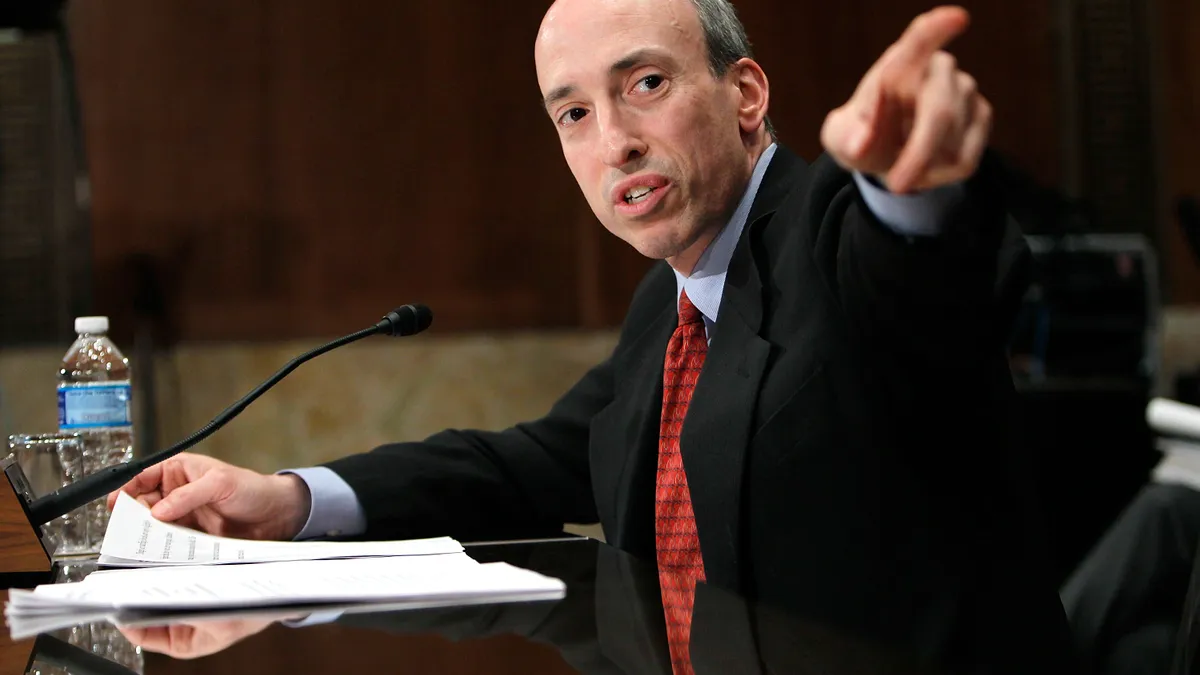Executives would have to return performance-based compensation if it stems from numbers in company financial reports that have to be restated, the Securities and Exchange Commission (SEC) says in a proposed rule it has dusted off from 2015 and plans to pursue anew.
The SEC already requires companies to claw back executive pay if the amount is based on profits or other performance metrics that were achieved through misconduct. In July, for example, the SEC sought to claw back the equity-based compensation of the CEO of FTE Networks, a telecom infrastructure company, after he and the CFO were charged with using accounting gimmicks to inflate company revenue by 108%.
The clawback requirement stems from the 2002 Sarbanes-Oxley law, passed after the WorldCom and Enron accounting scandals.
The proposed rule, announced Thursday, stems from the 2010 Dodd-Frank law, passed after the 2008 global financial crisis. It was initially proposed at the end of the Obama administration but was withdrawn to give the SEC leadership time to work out differences. It would extend clawbacks to include material misstatements that stem from errors.
The clawbacks aren’t intended as forms of punishment but rather adjustments to keep compensation aligned with actual numbers.
“Occasionally … the numbers the companies reported as the basis of … compensation aren’t accurate,” SEC Chair Gary Gensler said in a statement. “In these cases, companies may have to go back and revise or restate prior financial reporting. As a result, an executive may have been paid for meeting certain milestones that the company didn’t, in fact, hit.”
Fewer restatements
One result of the rule, should it be finalized and made effective, is an increased effort by companies to avoid making material restatements of their financials, say analysts.
“To the extent there are companies on the margins that want to push the envelope, this proposal would likely be an incentive for them to not issue a restatement when they otherwise might have,” Susan Schroeder, a partner with the law firm Wilmer Cutler Pickering Hale and Dorr LLP, told The Wall Street Journal.
The number of material restatements that are subject to SEC scrutiny have been trending down. Last year, companies only filed 325 of them, a drop of 60% from a decade earlier.
In their place, companies have been filing what are considered minor, or immaterial, restatements, which are too small to trigger enforcement. About 75% of restatements in recent years are these minor ones; 25 years ago, only about 35% of them were, according to Audit Analytics data reported by the Journal.
Mandating clawbacks could also push executives to make decisions that are less business-strategy based and more compliance-avoidance based, say academic researchers. A study released earlier this year found executives subject to in-house clawback rules didn't always make decisions in their company's best interests. Instead, they would pursue changes that improved earnings by lowering their taxes even if that wouldn’t necessarily lead to long-term company growth.
"Capital market pressures to meet earnings expectations do not subside following clawback adoption," the researchers said in their findings, published by the American Accounting Association. "Reducing income-tax expense is an attractive alternative."
New climate
The SEC’s move to breathe new life into the clawback rules comes at a time when companies on their own are imposing rules to keep bonuses and other compensation better tied to actual financials.
More than 2,000 of the approximately 5,500 companies listed on a public U.S. exchange have clawback provisions in place, according to data the SEC is using to help make its case for the rules. That’s up from about 1,320 in 2018 and fewer than 1,000 in 2015, when the rule was originally proposed.
“We have observed an increase in the number of issuers ... adopting and implementing executive compensation clawback policies,” the SEC has said.
Under its revived effort, the SEC wants the public to weigh in on its 2015 proposal. It wants U.S. exchanges like Nasdaq and the New York Stock Exchange to require their listed companies to adopt clawback rules for material misstatements. If companies refuse, the exchanges are to delist them. Where there is a material misstatement, companies are to go back up to three years in determining which compensation should be clawed back.
“Congress has decided that executives should pay back … incentive-based compensation that’s not based on accurate numbers,” Gensler said, referring in his statement to the Sarbanes-Oxley and Dodd-Frank laws. “We have an opportunity to strengthen the transparency and quality of corporate financial statements as well as the accountability of corporate executives to their investors.”



















